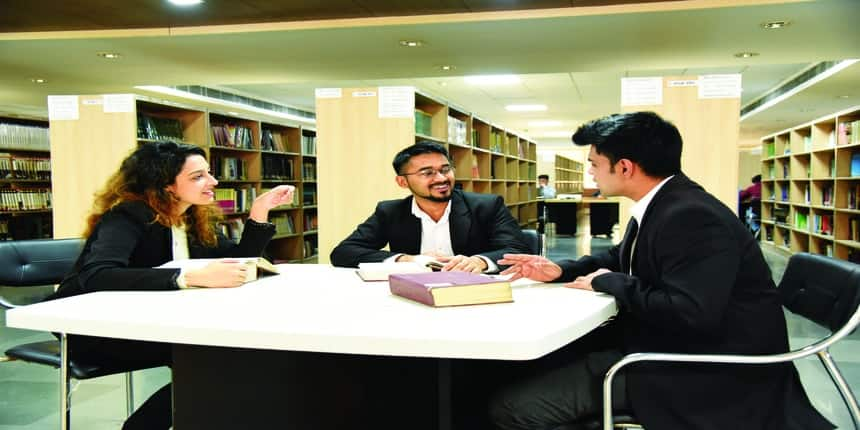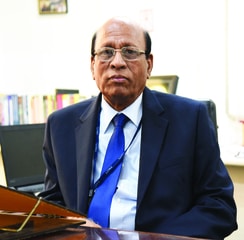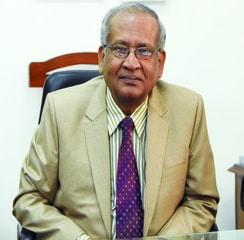ALS Campus Review: Grooming guardians of the constitution
Striking a balance between theory and practice, Amity Law School teaches budding lawyers to think like one before stepping into the competitive profession…

What’s in a name? A rose by any other name would smell as sweet. But, unfortunately, it doesn’t work that way in the legal domain. It would make a contract unviable! This is how Amity Law School Noida (ALSN) teaches law aspirants to think differently on each and every aspect related to law. A blend of traditional and modern methods of teaching law grooms the students in meeting the challenges of a legal career. “The course structure here is exhaustive. You will realize it when you will study whole of the IPC and CRPC bare acts in one semester. They will take your life! But, there couldn’t be a better start to embark on the journey of law,” said Priyanka Khare, a final year LLB student at ALSN.
Functioning since 2004, Amity Law School Noida is one of the biggest law schools in India with Bar Council of India’s (BCI) recognition. With over 4,000 students and more than 80 PhD scholars under its wings, it’s also one of the largest in Asia.
Quick Facts
Programmes: 5-year BA LLB (Hons.), BBA LLB (Hons.) and B.Com LLB (Hons.); 3-year LLB; 1-year LLM (12 specialisations, including Business Law, Constitutional Law, Criminal Law, Corporate Banking & Insurance Law, Family Law, Human Rights, Tax Law, Intellectual Property Law, International Environment Law, International Trade & Economic Law, Media & Entertainment Law and Medical & Health Law); M.Phil Law (full-time); PhD in law (full-time and part-time) Eligibility: 5-year LLB- 10+2 (min 60%); LLM- LLB or equivalent (min 50%) Selection Criteria: English Language Test, Subject-Based Written Test and Personal Interview Hostel: Available |
Range of programmes
The School of Law offers a range of law programmes across all levels. Sharing the course structure, Gagan Garg, B.Com LLB final-year student, specializing in Intellectual Property Rights, said, “In the five-year integrated programme, the first two years are very cool and light. But, after second year we have to buck up and prioritize everything. We have got to be serious.” In addition to regular course curriculum, the Chairman of Amity Law Schools, Dr. Dilip Kumar Bandyopadhyay, pointed out that it is mandatory for Amity students to take up an additional course in a foreign language. Furthermore, to impart enhanced understanding of social realities, a course on behavioural science is also offered.
Making your case to the wider world
Giving strongest possible start to students’ professional lives, ALSN has etched compulsory internship elements in the curriculum. Nilanjan Chatterjee, a final year BBA LLB student who plans to join a law firm after graduation, said, “The experience here combines practical knowledge with academics. Internship is a part of our annual curriculum. It is designed in such a way that the student is given about two months’ of internship. I have done four to five internships till now, mostly in litigation.”
In addition to internship, the law school teaches students to make their case using numerous activities like moot courts, mock parliaments, alternative dispute resolution tournaments, etc. These activities are planned and organized by students with the help of teachers. For instance, together with Australian Adelaide Law School, ALSN is set to organize an international conference on ‘Comparing Indian and Australian Constitutional Models’ in early 2019.
Updated syllabus
Talking about continuously updating the syllabus, Prof. S S Singh, Dean of ALSN, said, “Law is beyond litigation. Keeping in consideration the limitations and specifications laid by BCI, we bring about 10 percent changes annually to the syllabus to keep it relevant. This is done by introducing studies in new arena such as telecom spectrum, cyberlaw, space law etc.” Dr. Bandyopadhyay also says that ALSN takes care to ensure that they have a mixed bag of faculty with practical and theoretical experience.
Law journals, legal camps
Library is the core of any law institution and ALSN has a specially dedicated one and a knowledge resource centre with over 10,000 books and nearly 6,000 volumes of journals and reports. In addition, the library receives 109 journals and magazines and six national dailies. Students also get the access to over 200 journals, e-books and other resources in online mode.
Contributing to a thriving legal environment, ALSN has been running a biannual journal, i.e. Amity Law Review for nearly two decades. Recently, it also started ‘Amity International Journal of Juridical Sciences,’ a peer-reviewed journal published bi-annually. Furthermore, ALSN also houses Amity Judicial Academy and Law Foundation. Aditya Tomar, Additional Director of ALSN, said, “In Amity Judicial Academy, we provide training programs to mediators, arbitrators and students of law who are preparing for the judicial examinations. Under Amity Law Foundation, we cater to the needs of society via legal aid camps, legal advisory camps and lecture series of renowned law professors, advocates and judges.”
Unique ecosystem
Amity University has created an ecosystem of its own with the presence of a common canteen along with popular brands like Dominos, Cafe Coffee Day, among others on its campus. It forms the perfect environ for hostellers. Situated in the Medical City (because of the presence of Max Hospitals, Fortis, et.al.), better known as Arogya Dham, IT and Education city, the Noida campus has been divided into blocks from A to J. The F and I blocks are dedicated to the Faculty of Law. It also has an impressive array of sports and cultural activities with dedicated premises. ALSN graduates have successfully secured placements with eminent national and international law firms at Rele & Becker; Herbert Smith; Amarchand Mangaldas; Luthra and Luthra; Governmental Law Offices including NHRC, NCW, etc. The combination of a vibrant learning atmosphere coupled with experiential teaching methods and a dedicated Corporate Resource Centre to ensure placements makes ALSN a much sought after campus for the law aspirants.
#With inputs from Pritha Roy Choudhury
Prof. S S Singh, Dean, Amity Law School Noida Law is beyond litigation. Keeping specifications of BCI in consideration, we annually bring changes to the syllabus to keep it current and relevant |
Nilanjan Chatterjee, Final year student, BBA LLB, Amity Law School Noida Internship is a part of our annual curriculum. It is designed in such a way that the student is given about two months’ of internship. I have done four to five internships till now, mostly in litigation |
INTERVIEW
Dr. Dilip Kumar Bandyopadhyay, Chairman, Amity Law Schools Q. How is Amity School of Law different from the rest? A. At Amity School of Law Noida, there are approximately 4,000 students and that is a very unique strength of our law school. Wherever law graduates are needed we are trying to incorporate that and bridge the gap. Then we have a lot of internship programmes. During vacations, you will find our students going for practical training aided by the school. This helps them in getting an overall picture of the real world as to what happens in the court of law, how does it differ from the work at an agency, etc. Furthermore, learning at our campus is conducted from different sources -- from practitioners, researchers and by involving students directly in seminars and conferences. Additionally, we focus on reading and writing which is current in nature. Together, these elements give Amity’s Law Schools a unique identity. Q. Do you think it is necessary for faculty to visit courts? A. It is always a healthy practice. However, to maintain a balance between theory and practice, we have classified our faculty under two major categories. First is fundamental. It pertains to fundamentals which hardly change such as IPC, CRPC, etc. These are essentially being handled by the core faculty. Then we have about 25 percent of visiting faculty who come directly from the field -- either court of law or corporates. They teach students as to what is happening in the field and how to operate there. We also devote a prime amount of focus in updating the syllabus. Q. Tell us about the placement facility for graduates... A. This is again I will say is our uniqueness. We are the first college in the country to have a proper placement office for law. We call it CRC (Corporate Resource Centre). This was created in 2016. As its part, we also have an HR summit wherein HR persons are invited and become a part of discussion forum. People from the corporate law firms and other recruiters come and talk on pressing topics in recruitment arena. This has proved to be a great way to break the ice. We then follow up with the respective HR departments for the interview. I would say 50 percent of our students opt for placements, while many of them go for higher education or for practice or judicial services. |
List of colleges accepting exam
Browse Law Colleges by State
Applications for Admissions are open.
Among top 100 Universities Globally in the Times Higher Education (THE) Interdisciplinary Science Rankings 2026
Chandigarh University Admissions 2026
ApplyNAAC A+ Accredited | Among top 2% Universities Globally (QS World University Rankings 2026)
Amity University-Noida LLM Admissions 2026
ApplyAmong top 100 Universities Globally in the Times Higher Education (THE) Interdisciplinary Science Rankings 2026
Manav Rachna University Law Admissions 2026
ApplyAdmissions open for B.A. LL.B. (Hons.), B.B.A. LL.B. (Hons.) and LL.B Program (3 Years) | School of Law, MRU ranked No. 1 in Law Schools of Excellence in India by GHRDC (2023)
RV University, Bangalore | Law Admissions 2026
ApplyExcellent curriculum; an impressive range of electives, besides core law courses. Up to 100% merit scholarship on a first-come, first-served basis
Unitedworld School of Law Admissions 2026
ApplyMoot Court | Mock trials | Legal Aid Clinic
 Image: Prof. S S Singh
Image: Prof. S S Singh
 Image: Dr. Dilip Kumar Bandyopadhyay
Image: Dr. Dilip Kumar Bandyopadhyay